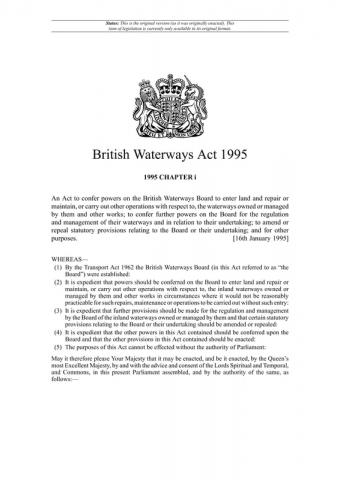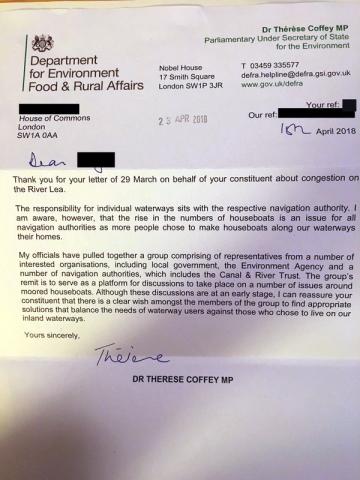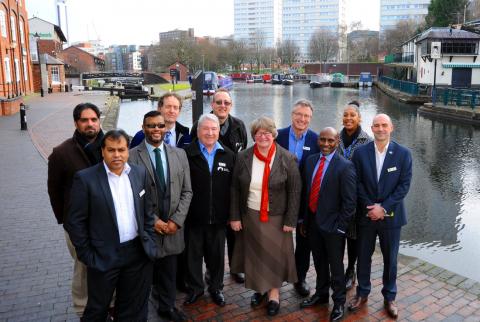Liveaboard law changes feared as minister looks for 'solutions'
May 2018 - A leaked letter from a junior Tory minister with reponsibility for waterways at the Department for Environment, Food and Rural Affairs, reveals that she has set up a group to, 'find appropriate solutions that balance the needs of waterway users against those who chose to live on our inland waterways' Peter Underwood reports there is now widespread speculation that boaters' rights under the 1995 Waterways Act may be under attack by government.
The letter from Thérèse Coffey to an East London MP who had passed on a constituent's complaint about overcrowding on the River Lea, appeared on social media last week. It clearly demonstrates that Defra has set up a 'group' that includes local councils, the Environment Agency and Canal & River Trust – but has so far excluded all boating organisations.
It's aims seem to be fairly clear – Defra seems to see people living on their boats as a problem and wants to find 'solutions' and that has led London boaters, in particular, to believe the key part of the 1995 Act may be up for amendment or abandonment.
It says boats without a home mooring “will be used bona fide for navigation throughout the period for which the consent is valid without remaining continuously in any one place for more than 14 days or such longer period as is reasonable in the circumstances.”
Thérèse Coffey, who was being avidly courted by C&RT when the Tory conference was taking place in Birmingham last year, tells the MP:
“Thank you for your letter of 29 March on behalf of your constituent about congestion on the River Lea.
“The responsibility for individual waterways sits with the respective navigation authority. I am aware, however, that the rise in the numbers of houseboats is an issue for all navigation authoritiues as more people chose to make houseboats along our waterways their homes.
“My officials have pulled together a group comprising of representatives from a number of interested organisations, including local government, the Environment Agency and a number of navigation authorities, which includes the Canal & River Trust. The group's remit is to serve as a platform for discussions to take place on a number of issues around moored houseboats. Although these discussions are in an early stage, I can reassure your constituent that there is a clear wish amongst the members of the group to find appropriate solutions that balance the needs of waterway users against those who chose to live on our inland waterways”
The Floater asked Defra what was going on, pointing out that the letter had provoked considerable concern as it seemed to many boaters that it was a secretive attempt by the minister to change some of the basic rules of the waterways, including the 1995 British Waterways Act.
Defra were also asked whether it was the intention that the deliberations of this group would, at some stage, change the way boaters live on their boats on the English and Welsh waterways?
We also wanted to know why the primary organisations representing boaters and liveaboard boaters had not been invited to be part of this group - specifically the Residential Boat Owners Association, National Association of Boat Owners and the National Bargee Travellers Association?
Finally we wanted to know what organisations had persuaded Defra that such a group is necessary?
The response from Defra was far from detailed. The press office told us that the minister's letter was sent in regards to complaints over congestion in the River Lea, but the group was set up following concerns on the Thames.
Defra's PR person said: “The working group was set up in response to concerns raised by several MPs and waterway users around a number of boats being used as rented accommodation on the River Thames - moored to publicly accessible land without the landowner’s permission.
“These concerns, alongside an increased use of waterways for residential purposes, led to a commitment to form a group consisting initially of the main navigation authorities and other groups such as the Ministry of Housing, Communities and Local Government.
“The purpose of this group is to provide a platform to discuss experiences and differing perspectives of the issues.
“At the initial meeting held in December 2017, it was agreed that user groups could be invited to help with the group’s work and the terms of reference for the group are now being determined.”
Canal & River Trust has clearly been involved in the group from the start and we asked if it would tell us the group's objectives, and what stance C&RT was taking?
The response from senior PR Jonathan Ludford was even less informative than Defra: “I understand the group initially met at the end of last year and that terms of reference are being worked-up.
“In short, the group’s intention is to evaluate the challenges associated with the growth in demand for living on the waterways. Along with other navigation authorities we are contributing to the discussions.”
Anna Kroger, a River Lea boater, described the minister's letter as ' very concerning' on Facebook: “She has got together a group to 'find appropriate solutions that balance the needs of waterway users against those who chose to live on our inland waterways'.
“The tone is concerning, and it's also a slap in the face of all liveaboard boaters who have been helping to clean the Lea from oil and other pollution.”
It swiftly turned out that the major boating organisations had been kept in the dark with Alan Wildman of the Residential Boat Owners Association saying: “We have heard nothing of this. Would love a copy if possible so that we can ask questions
Helen Del Mar of the NBTA said: “I would be real keen to keep an eye on all this.”
The National Association of Boat Owners also knew nothing and - most surprisingly of all – nor did the IWA, which has long urged C&RT to curb the freedoms of liveaboard, continuously cruising, boaters.
The IWA told The Floater that it has first learned of the group when it, too, saw a copy of the Coffey letter. It went on to say: “ IWA is looking forward to giving input to the working group’s discussions and we hope that it will take note of the views of IWA and other waterways organisations”.
Boaters have already sent Freedom of Information requests about the group to Defra seeking to learn of its objectives and discussions.
Mark Tizard of NABO has reminded boaters of a C&RT press release on licensing that says: “There will be no difference in licence fees for boats without a home mooring. Instead, the Trust will be undertaking further work to develop a fair means of reflecting the benefits experienced by boaters without home moorings who remain in the most popular places like London.”
As he points out: “Benefits is a carefully chosen word. C&RT is allowed to charge for a benefit.”
Only time will tell if a junior minister, with little power over the Inland Waterways since the formation of C&RT and much more pressing legislative priorities, will be willing to give any time or consideration to whatever this group finally produces in the way of conclusions.
Unless any changes in the law can be piggy-backed on some catch-all piece of Defra legislation - perhaps as part of the Brexit law-making - the political realities suggest the group is likely to be a talking shop and the official participants will be left to their own devices to implement any decisions using their existing legal powers, or some interpretation of those powers.
Photos: (1st) British Waterways Act 1995 - now under threat from Defra? (2nd) The letter sent from Therese Coffey to a local MP which sounded the alarm bells, (3rd) Therese Coffey surrounded by C&RT executives, including Richard Parry when she attended the Tory conference in Birmingham, (4th) Therese Coffey, junior minister at Defra.









